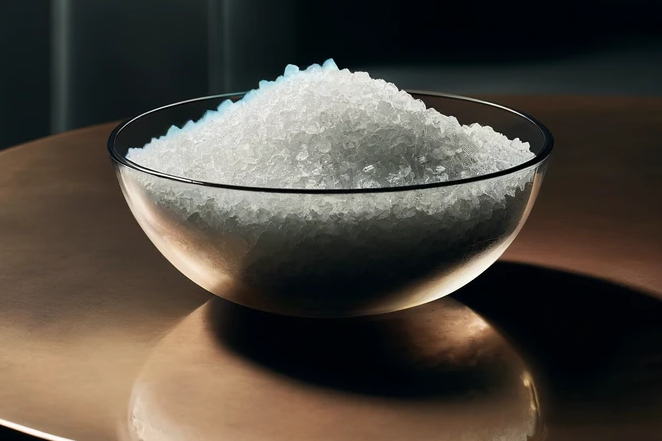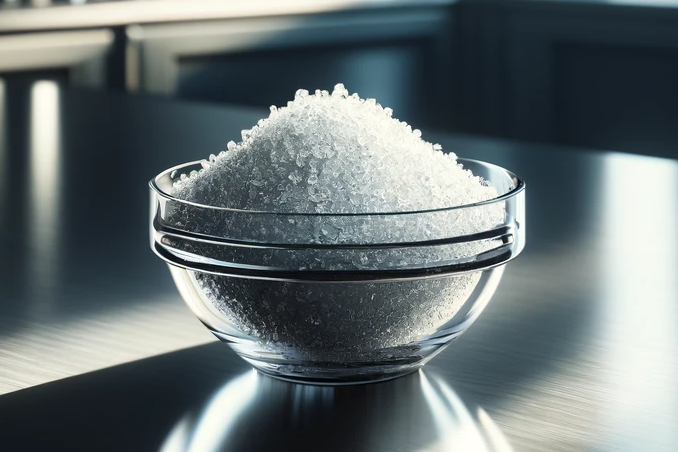Sodium citrate

Sodium citrate, a salt often used in food as a preservative or acidity regulator, is also finding its way into the animal world. But while its role in human nutrition is well documented, its use in dogs raises questions. This article dives deep into the topic of sodium citrate, examining what it is and highlighting the potential pros and cons of its use in dogs to offer a comprehensive understanding of this chemical compound and its effects on our four-legged friends.
What is sodium citrate?
Chemical composition and use
Sodium citrate (trisodium citrate) is the sodium salt of citric acid, an organic acid that occurs naturally in citrus fruits. It is known for its ability to regulate pH and stabilize metal ions in solutions. In the food industry, sodium citrate is often used to give foods a slightly acidic taste or as a preservative.
Occurrence in dog-related products
In relation to dogs, sodium citrate can be found in certain feed, supplements or treatment products to improve shelf life, optimize taste or support health.
Benefits of sodium citrate for dogs
Supporting urinary tract health
One potential benefit of sodium citrate for dogs is its ability to prevent or reduce the formation of kidney stones. By alkalizing the pH of urine, it can reduce the risk of stone formation and contribute to overall urinary tract health.
Preservation and flavor enhancement
Sodium citrate can help to extend the shelf life of dog food while improving the taste. This can be particularly useful in wet foods or special diets formulated for health conditions.
Disadvantages and risks
Electrolyte imbalance
Excessive intake of sodium citrate can lead to electrolyte imbalance in dogs as it increases sodium in the body. This can lead to complications, especially in dogs with existing heart, kidney or blood pressure problems.
Gastrointestinal complaints
As with any additive, sodium citrate carries the risk of gastrointestinal upset, including nausea, vomiting or diarrhea, especially when consumed in large quantities.
Potential interactions
Sodium citrate may interact with certain medications, which could affect their effectiveness or cause unwanted side effects. It is important to consider this in dogs already receiving drug treatment.
A balanced approach is key
Sodium citrate can offer both benefits and drawbacks for dogs. Its potential role in supporting urinary tract health and preserving food makes it an interesting ingredient in dog nutrition. However, the potential risks, such as electrolyte imbalance and gastrointestinal discomfort, should not be underestimated.
As a responsible dog owner, it is important to carefully monitor the use of products containing sodium citrate and seek professional advice if in doubt. A balanced diet tailored to your dog's individual needs remains the key to their long-term health and well-being.
If you notice any signs of hypersensitivity or poisoning in your dog, you should see your vet immediately. We are not a substitute for a vet, but we try to be as accurate as possible. Every dog reacts differently and we recommend you get a second opinion or consult your vet if in doubt.
Stay healthy and take good care of your four-legged friend!😊
Similar to Sodium citrate
Urinary stones are solid deposits of various substances that can form in the urinary tract of dogs. They can vary in size, shape and composition. The most common types of urinary stones in dogs are...
Sodium acetate (CH3COONa) is the sodium salt of acetic acid. It is a white, crystalline powder that dissolves easily in water and forms an alkaline solution. Sodium acetate is known for its...
Magnesium citrate is a compound that is formed when magnesium oxide reacts with citric acid. This combination makes it a magnesium salt that is valued in animal nutrition for its good solubility and...
Calcium citrate is an organic compound of calcium and citric acid. It is a white powder or granulate that dissolves well in water. Calcium citrate has an acidic taste and can be used as an acidifier...



